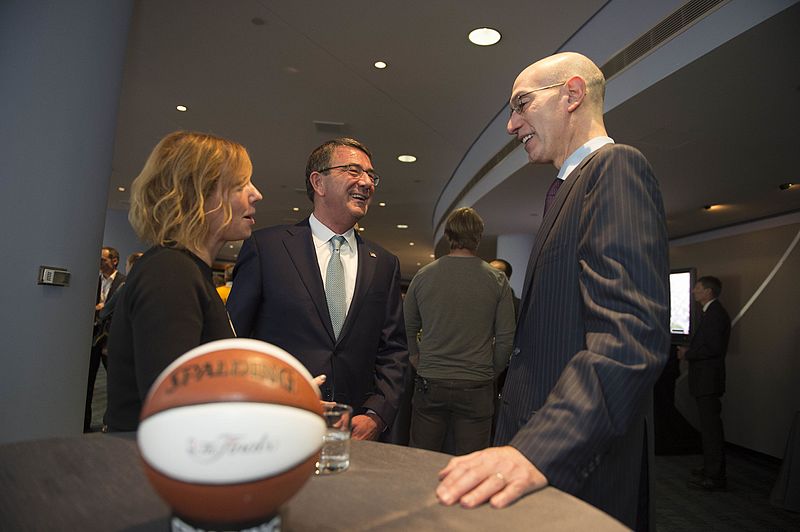Views expressed in opinion columns are the author’s own.
At the beginning of this school year, the news was quiet. The Democratic primary was fairly stable, the University of Maryland was patiently awaiting the hire of a new president and I didn’t even know what a ventilator was. Life was alright — which meant I was really desperate for column ideas. Good times make for bad takes, the columnists’ adage goes. And so, my generous and indulgent editors permitted me to write about a matter of real import: the upcoming NBA season.
It was supposed to be a really good one — the National Basketball Association was in the midst of what I called its “social democratic period.” The league was quite profitable, and those profits sustained a broad labor peace between players and owners. For the first time in several years, the Golden State Warriors weren’t expected to cruise to a title, and there was considerable parity at the top of the league. The NBA’s biggest stars were undeniably awesome to watch, and the dramatic player movement made the league fun to follow every month of the year. However, I warned that this golden age wouldn’t last forever. When, for whatever reason, the NBA would become less profitable, players would need to be ready to fight hard for their piece of the pie.
Never did I expect NBA social democracy to end as quickly and dramatically as it has. The 2019-20 season began with a geopolitical crisis between the NBA and China over a fairly anodyne tweet from Rockets’ general manager Daryl Morey supporting protesters in Hong Kong. Several of the league’s biggest stars — Steph Curry, Kevin Durant, Zion Williamson — were injured for all or most of the season. This season also saw the death of Lakers superstar Kobe Bryant and legendary former NBA commissioner David Stern. And now, the coronavirus has put the season on hold and may well cause its cancellation.
So now, players and owners are negotiating a way to manage the massive revenue shortfall they face. Who should bear the financial pain? Should players accept pay cuts? Should owners eat the losses? Some combination of both is likely, but the precise balance is up in the air.
Like any other labor negotiation, both labor and management have some leverage here. The league’s owners are, of course, much wealthier than the players. There’s also a provision in the NBA’s most recent collective bargaining agreement which could allow owners to cancel the rest of the season and completely withhold player salaries for the rest of the year due to the pandemic. Doing so would look terrible — a bunch of billionaire owners refusing to pay players what their contracts promised — and would likely provoke a dramatic response from players, including a possible strike.
On the other hand, players have leverage because they’re the league’s primary source of value. Fans actually like NBA players, and they usually pay attention to an NBA owner when they’ve messed up. And so, players can always threaten to withhold their labor. This is an even more powerful threat than in a normal labor dispute. A manager might be able to hire scabs to fill in for striking workers at a grocery store or in a factory, but there is no scab who can hope to replicate what LeBron James does on a basketball court. These guys are really good at basketball. Without them, the league doesn’t exist. The same can’t really be said for the current crop of league owners.
In strategizing their approach to the revenue shortfall, the players union should consider not just what gets players the most money in the coming months but also what measures will maximize player power in the years to come. If the NBA’s social democratic period is coming to an end, players will need formal power to sustain their financial position. That’s why I think the union should offer to accept fairly significant salary reductions in exchange for a partial ownership stake in all the league’s teams. That would mean the union would “own” a certain percentage of every team and exercise partial shareholder control over the teams — just like any other investor.
This idea is partially based on a 1984 proposal from Harvard economist Stephen A. Marglin, who suggested workers should agree to wage controls during times of dramatic inflation in exchange for greater decision-making power over their firms. Hyperinflation is obviously quite different than what the NBA faces right now, but there are some similarities. Namely, both are situations in which labor will probably have to swallow some losses. But if they’re smart and organized, workers can appear magnanimous by volunteering to accept reduced pay while making demands that increase their leverage over management in the long term.
No matter how the NBA resolves its financial crisis, one thing remains clear: This is not a time for labor to be nice. If ownership starts playing hardball out of a fear of declining profits and the players union doesn’t prepare, the so-called era of player empowerment could become nothing more than a memory.
Max Foley-Keene is a senior government and politics major. He can be reached at maxfkcap2016@gmail.com.



